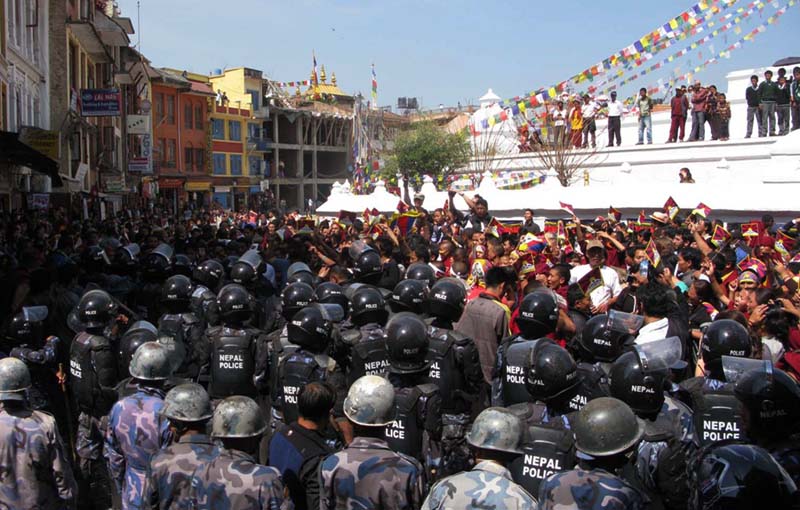 Kathmandu: Nepal police seized ballot boxes in Kathmandu, the capital of Nepal, preventing Tibetan exiles from electing a local leadership, according to a latest report received by The Tibet Post International. This is the second time Nepal government have disrupted elections held by Tibetan refugees in the region.
Kathmandu: Nepal police seized ballot boxes in Kathmandu, the capital of Nepal, preventing Tibetan exiles from electing a local leadership, according to a latest report received by The Tibet Post International. This is the second time Nepal government have disrupted elections held by Tibetan refugees in the region.
Our sources said police last Sunday raided three places in Kathmandu, Swoyambhu, Jawalakhel and Boudha, where voting for the new members of standing committee of the Welfare Society of Central Dhokham Chushi Gangdrug was taking place.
Around 08 a.m., a van arrived at the voting hall in Boudha and police wearing riot-gear and carrying guns and batons said the raid was ordered by the chief district officer on the ground that Tibetans were prohibited from taking part in any election. But, the police returned after they got explained from the members of the local election committee, saying "Nepal Dhokham Chushi Gangdrug in Kathmandu is a registered organisation in the country and the election has nothing to do with politics."
Around 11 a.m., several vans arrived at the voting places in Kathmandu, Swoyambhu, Jawalakhel and Boudha, repeating Tibetan refugees are not allowed to hold elections for any reason. Some of ballot boxes were seized from the Boudha area. However. other two locations Swoyambhu and Jawalakhel elections had already been concluded in the voting centers before police arrived.
The police action was the latest police harassment of Nepal's long-staying Tibetan community and underscores Nepalese authorities' effort to prohibit what it perceives as anti-China activities by Tibetan refugees in its territory. In October last year, police seized ballot boxes and prevented Tibetan exiles from voting in the primary election for the next prime minister of the Tibetan government-in-exile based in Dharamshala, India. There are more than 20,000 Tibetan refugees living in about 12 settlements across the country.
Nepal officially claims the so called Tibet Autonomous Region part of China and has vowed to prevent anti-China activities by Tibetan refugees in the Himalayan region. More than 20,000 registered Tibetan refugees live in Nepal, but thousands more who arrived after 1989 when Nepal stopped granting refugee status to Tibetans, are believed to be living in Nepal.
The Welfare Society of Chushi Gangdrug in Nepal election is also decades-old practice and the organisation is registered as "Nepal Dhokham Chushi Gangdruk" in Kathmandu. The Welfare Society of Central Dhokham Chushi Gangdrug has 5 regional chapters in Asia, North America and Europe and over thousands of members from eastern Tibet outside their homeland. Today, the central and it's chapters principally looking after the welfare of hundreds of Tibetans in exile mainly veterans of the Tibetan resistance force that battled the so called Chinese People's Liberation Army from 1958 to 1974.


![Tibet has a rich history as a sovereign nation until the 1950s when it was invaded by China. [Photo: File]](/images/stories/Pics-2024/March/Tibet-Nation-1940s.jpg#joomlaImage://local-images/stories/Pics-2024/March/Tibet-Nation-1940s.jpg?width=1489&height=878)















